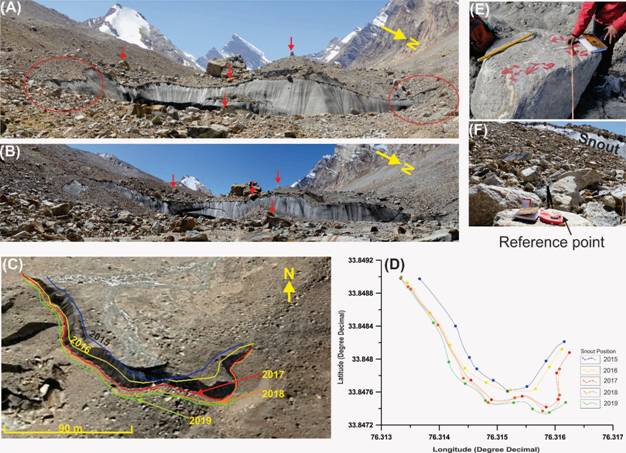

Increasing Temperature and Low Winter Precipitation are Causing Retreat of Glaciers in Zanskar Valley, Ladakh
<p>
The Pensilungpa Glacier, located in Ladakh&rsquo;s Zanskar valley, is retreating due to an increase in the temperature and decrease in precipitation during winters, according to a study carried out by the Wadia Institute of Himalayan Geology.</p>
<p>
Field observations for the last 4 years (2015&ndash;2019) showed that the glacier is now retreating by at an average rate of 6.7 &plusmn; 3 m a&minus;1. In the study published in the journal Regional Environmental Change, the team attributes the observed recessional trends of the Pensilungpa Glacier to an increase in the temperature and decrease in precipitation during winters.</p>
<p>
The study also points at the significant influence of debris cover on the mass balance and retreat of the glacier&#39;s endpoint, especially in summer. Furthermore, the mass balance data for the last 3 years (2016&ndash;2019) showed a negative trend with a small accumulation area ratio.</p>
<p>
The study also suggests that due to continuous rise in the air temperature in line with the global trend, the melting would increase, and it is possible that the precipitation of summer periods at higher altitudes will change from snow to rain, and that may influence the summer and winter pattern.</p>
<p>
<strong>Also read:</strong>&nbsp;&nbsp;<a href="https://www.indianarrative.com/world-news/water-flow-in-indus-ganga-brahmaputra-to-increase-till-s-says-iit-study-97374.html">Water flow in Indus, Ganga &amp; Brahmaputra to increase till 2050s, says IIT study</a></p>
<p>
Since 2015, the Dehradun-based Wadia Institute of Himalayan Geology, an autonomous institute under the Central government&rsquo;s Department of Science &amp; Technology, has been working on various aspects on glaciology. These include glacier health (mass balance) monitoring, dynamics; discharge, past climatic conditions, speculation for future climate change and its impact on glaciers in this region. A team of scientists from the institute ventured to study Zanskar in Ladakh which is a less explored area of the Himalayas.</p>
<p>
Its study was based on field observations for glaciers mass balance collected via stake networking&nbsp; (stake made of bamboo, is installed on the glacier surface using the steam drill for mass balance measurement) over the glacier surface since 2016-2019. The team assessed the impact of climate change through the lens of past and present response of the Pensilungpa Glacier.</p>
By Shalini Bhardwaj A government-appointed expert committee in Karnataka has found no evidence linking COVID-19…
BRICS leaders convened in Rio de Janeiro for the 17th BRICS Summit from July 6…
Vietnam's Ambassador to India, Nguyen Thanh Hai, highlighted the strong cooperation between Vietnam and India,…
Leaders of the BRICS nations welcomed Indonesia as a member of the group, while 10…
External Affairs Minister S Jaishankar held a meeting with his Russian counterpart Sergey Lavrov on…
The Russian military has carried out a series of strikes on Ukrainian military-related targets in…